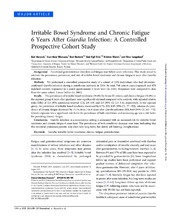| dc.description.abstract | Background. Functional gastrointestinal disorders and fatigue may follow acute infections. This study aimed to estimate the persistence, prevalence, and risk of irritable bowel syndrome and chronic fatigue 6 years after Giardia infection. Methods. We performed a controlled prospective study of a cohort of 1252 individuals who had laboratory-confirmed Giardia infection during a waterborne outbreak in 2004. In total, 748 cohort cases (exposed) and 878 matched controls responded to a postal questionnaire 6 years later (in 2010). Responses were compared to data from the same cohort 3 years before (in 2007). Results. The prevalences of irritable bowel syndrome (39.4%) by Rome III criteria and chronic fatigue (30.8%) in the exposed group 6 years after giardiasis were significantly elevated compared with controls, with adjusted relative risks (RRs) of 3.4 (95% confidence interval [CI], 2.9–3.9) and 2.9 (95% CI, 2.3–3.4), respectively. In the exposed group, the prevalence of irritable bowel syndrome decreased by 6.7% (RR, 0.85 [95% CI, .77–.93]), whereas the prevalence of chronic fatigue decreased by 15.3% from 3 to 6 years after Giardia infection (RR, 0.69 [95% CI, .62–.77]). Giardia exposure was a significant risk factor for persistence of both conditions, and increasing age was a risk factor for persisting chronic fatigue. Conclusions. Giardia infection in a nonendemic setting is associated with an increased risk for irritable bowel syndrome and chronic fatigue 6 years later. The prevalences of both conditions decrease over time, indicating that this intestinal protozoan parasite may elicit very long-term, but slowly self-limiting, complications. | en_US |

